Can Cats Eat Roast Beef? A Vet-Reviewed Guide to Safe Sharing
- 30 Apr 2025 10:06
The Sunday roast is cooking, filling the house with a mouthwatering aroma. As you carve the roast beef, you feel a familiar furry presence winding around your ankles, looking up with pleading eyes. It's tempting to share a small piece of that delicious meat with your feline companion. But before you do, the crucial question arises: can cats eat roast beef? Is this human staple safe for our obligate carnivore friends?
The answer is nuanced: Yes, plain, thoroughly cooked roast beef can be safe for cats in *very small quantities* as an occasional treat. However, the preparation method, seasonings, fat content, and portion size are critical factors that determine safety. Many forms of roast beef prepared for human consumption are decidedly *unsafe* for cats.
This comprehensive guide, grounded in veterinary knowledge and EEAT principles (Expertise, Authoritativeness, Trustworthiness), will explore everything you need to know about feeding roast beef to cats. We'll cover the potential benefits, significant risks, safe preparation methods, appropriate portion sizes, and why certain types of roast beef should be strictly avoided.

What Exactly is Roast Beef? Understanding the Basics
Roast beef, in its simplest form, is a cut of beef that has been cooked using dry heat, typically in an oven. Common cuts used for roasting include sirloin, tenderloin, ribeye, round, and chuck. The preparation can vary wildly:
Home-Cooked Plain Roast Beef: Simply beef roasted with no added salt, spices, oils, or other ingredients. This is the safest starting point for potential cat consumption.
Home-Cooked Seasoned Roast Beef: Beef roasted with salt, pepper, herbs, garlic, onions, marinades, or sauces. These additions are often problematic for cats.
Deli Roast Beef: Pre-cooked, thinly sliced beef sold at delicatessens. This type is almost always heavily processed, containing high levels of sodium, nitrates, nitrites, and potentially harmful seasonings.
Pre-Packaged Roast Beef: Similar to deli meat, often found vacuum-sealed in supermarkets, typically high in sodium and preservatives.
Understanding these distinctions is vital because their suitability for cats differs dramatically.
The Carnivore Connection: Why Beef Appeals to Cats
Cats are obligate carnivores. This biological classification means their bodies are specifically adapted to derive nutrients primarily from animal tissue. Meat isn't just a preference for cats; it's a physiological necessity.
High Protein Needs: Cats require significantly more protein than omnivores like dogs or humans. Protein provides essential amino acids for building and repairing tissues, producing enzymes and hormones, and supporting immune function. Beef is an excellent source of high-quality animal protein.
Essential Nutrients in Meat: Animal tissues provide vital nutrients that cats either cannot synthesize themselves or cannot efficiently derive from plant sources. These include:
Taurine: Crucial for vision, heart function, digestion, and reproduction. Deficiencies can lead to serious health issues like dilated cardiomyopathy (DCM) and retinal degeneration. While cooking can degrade taurine, meat is its primary source.
Arachidonic Acid: An essential omega-6 fatty acid vital for skin health, reproductive function, and inflammation response.
Preformed Vitamin A (Retinol): Cats cannot effectively convert beta-carotene from plants into Vitamin A and need the preformed version found in animal liver and fat.
Vitamin B12: Essential for neurological function, red blood cell formation, and DNA synthesis, primarily found in animal products.
Given their carnivorous nature, the smell and taste of cooked beef are naturally appealing to most cats. It aligns with their instinctual dietary requirements.
Safety First: Is Plain, Cooked Roast Beef Safe for Cats?
Yes, small amounts of *plain*, *thoroughly cooked*, *lean* roast beef with *no bones* are generally considered safe for healthy adult cats as an occasional treat. Let's break down those qualifiers:
Plain: Absolutely no salt, pepper, herbs, spices, garlic, onion, sauces, marinades, or oils added during cooking. Many common seasonings are toxic to cats (especially garlic and onion).
Thoroughly Cooked: Raw or undercooked beef poses a risk of bacterial contamination (like Salmonella or E. coli) and parasites. Cooking kills these harmful organisms.
Lean: Excessive fat can cause gastrointestinal upset (vomiting, diarrhea) and contribute to pancreatitis, a painful and potentially serious inflammation of the pancreas. Trim visible fat before offering.
No Bones: Cooked bones become brittle and can splinter easily, posing a severe choking hazard and risk of internal punctures in the mouth, throat, stomach, or intestines.
So, if you've roasted a piece of beef completely plain, trimmed the fat, removed any bones, and cooked it well-done, sharing a tiny piece is unlikely to harm your cat. Therefore, when prepared correctly, the answer to "can cats eat roast beef?" is a cautious yes.
Potential Health Benefits of Roast Beef for Cats (When Prepared Correctly)
When offered as a tiny, occasional treat according to the safety guidelines above, plain roast beef can offer some minor nutritional benefits:
High-Quality Protein: Provides essential amino acids for muscle maintenance and overall health.
Iron Source: Beef is rich in heme iron, which is more easily absorbed than non-heme iron from plants, supporting red blood cell production and preventing anemia.
B Vitamins: Contains important B vitamins, particularly B12, niacin (B3), and B6, crucial for energy metabolism, enzyme function, and nervous system health.
Zinc: Supports immune function, wound healing, and healthy skin and coat.
Taurine Boost (Minimal): While cooking reduces taurine levels, meat remains the fundamental source. Small amounts contribute minimally to their overall intake, which should primarily come from their balanced cat food.
Palatability Boost: For picky eaters or cats needing encouragement to eat (e.g., during illness, under vet supervision), a tiny bit of plain beef might stimulate their appetite.
Remember, these benefits are associated with *very small treat quantities*. Roast beef should never replace your cat's nutritionally complete and balanced regular food.
Significant Risks and Why Caution is Crucial
The potential risks associated with feeding roast beef often outweigh the benefits, especially if it's not prepared specifically for cats:
Toxic Seasonings: This is a major danger.
Onions, Garlic, Chives, Leeks: All members of the Allium family are toxic to cats, whether raw, cooked, or powdered. They damage red blood cells, leading to anemia (hemolytic anemia). Signs might not appear for several days.
Other Spices/Herbs: While some herbs are safe, many spice blends contain onion or garlic powder, and the effects of various other spices on cats aren't always well-known. It's safest to avoid all seasonings.
Excessive Sodium (Salt):
Deli/Processed Meats: These are exceptionally high in sodium, used for preservation and flavor.
Home-Seasoned Meat: Even moderate salt added for human taste can be too much for a cat.
Risks: High salt intake can cause increased thirst/urination, vomiting, diarrhea, and in severe cases, sodium ion poisoning (tremors, seizures, coma). It's particularly dangerous for cats with kidney or heart conditions.
High Fat Content:
Fatty Cuts/Untrimmed Fat: Can lead to digestive upset (vomiting, diarrhea).
Pancreatitis Risk: High-fat meals are a known trigger for pancreatitis in susceptible cats.
Obesity: Adds unnecessary calories, contributing to weight gain and associated health problems (diabetes, arthritis).
Bones: Cooked bones are extremely dangerous. They can splinter easily, causing choking, mouth injuries, esophageal or intestinal obstruction, or internal perforation. Never give cooked bones to cats.
Preservatives and Additives: Deli meats and processed roast beef often contain nitrates, nitrites, artificial flavors, and other chemicals that are unnecessary and potentially harmful for cats long-term.
Raw Meat Risks: While some advocate for raw diets, feeding raw beef carries risks of Salmonella, E. coli, Listeria, and parasites, which can make both the cat and the humans in the household sick. Thorough cooking eliminates these risks.
Beef Allergies/Sensitivities: Some cats can develop allergies or sensitivities to beef protein, leading to skin issues (itching, hair loss) or gastrointestinal problems (vomiting, diarrhea).
Nutrient Imbalance: Feeding too much roast beef (or any treat) can displace the cat's regular balanced diet, potentially leading to nutrient deficiencies or excesses over time. Treats should follow the 10% rule (see below).
How to Safely Prepare Roast Beef for Your Cat: A Step-by-Step Guide
If you choose to offer roast beef as a rare treat, follow these steps meticulously:
Select Lean Beef: Choose a lean cut with minimal marbling.
Prepare Plain: Do NOT add any salt, pepper, herbs, spices, oil, butter, garlic, onion, marinades, or sauces before or during cooking. Cook it completely separately from any seasoned portion for humans.
Cook Thoroughly: Roast, bake, or boil the beef until it is well-done throughout. Ensure there are no pink or raw parts. An internal temperature of at least 160°F (71°C) is recommended for ground beef, and similar thoroughness for roasts intended for pets.
Remove ALL Bones: Before, during, and after cooking, ensure absolutely no bones are present.
Trim ALL Visible Fat: After cooking, carefully trim away any remaining fat cap or large sections of fat.
Cool Completely: Allow the beef to cool down to room temperature to avoid burning your cat's mouth.
Dice or Shred Finely: Cut the lean, cooked, plain beef into very small, easily manageable pieces (pea-sized or smaller) or shred it finely.
Offer a Tiny Portion: Start with just one or two small pieces.
Adhering strictly to these steps is the only way to minimize risks when considering if can cats eat roast beef.
Portion Patrol: How Much Roast Beef Can Cats Have?
Moderation is absolutely essential. Roast beef should only ever be an occasional, tiny treat, not a regular part of the diet.
The 10% Rule: Treats, including plain roast beef, should not exceed 10% of your cat's total daily caloric intake. For most cats, this means a very small amount.
Treat Size: A thumbnail-sized amount (or about 1 teaspoon of finely diced/shredded meat) is generally sufficient as a treat for an average-sized cat. Start with even less.
Frequency: Offer it only occasionally – perhaps once a week or even less often, not daily.
Introduction: The first time you offer roast beef, give only a minuscule piece and monitor your cat for 24-48 hours for any signs of digestive upset (vomiting, diarrhea) or allergic reaction (itching).
Consider Overall Diet: Factor in any other treats your cat receives to stay within the 10% guideline.
Veterinary Consultation: If your cat has any health conditions (especially kidney disease, heart disease, pancreatitis history, food allergies, or sensitivities), consult your veterinarian *before* offering any new food, including roast beef.
Deli Roast Beef vs. Home-Cooked: A Critical Distinction
It's crucial to understand that deli-style or pre-packaged sliced roast beef is vastly different from plain, home-cooked beef and is generally **not recommended** for cats.
| Feature | Plain Home-Cooked Roast Beef | Deli/Processed Roast Beef |
| Sodium Content | Naturally low (no added salt) | Extremely High |
| Seasonings | None (if prepared correctly for cat) | Often contains salt, sugar, potentially onion/garlic powder, other spices |
| Fat Content | Can be controlled by trimming | Variable, often includes processed fats/oils |
| Preservatives (Nitrates/Nitrites) | None | Commonly Added |
| Suitability for Cats | Safe in tiny amounts as an occasional treat if lean, plain, boneless, cooked. | Generally Unsafe/Unhealthy; Should be Avoided. Poses risks even if asking "can cats eat roast beef" in this form. |
The high sodium and preservative content alone make deli roast beef a poor choice for feline health.
When Should You Absolutely Avoid Giving Roast Beef?
There are situations where feeding even plain, cooked roast beef is not advisable:
Cats with Kidney Disease: Require controlled protein and low phosphorus diets. While protein is essential, the type and amount need careful veterinary management. High protein treats can strain compromised kidneys. Sodium control is also paramount.
Cats with Heart Conditions: Strict sodium restriction is often necessary.
Cats with Pancreatitis History: Require low-fat diets to prevent flare-ups. Even lean beef might be too rich.
Cats with Known Beef Allergies or Sensitivities: Avoid completely if your cat has a diagnosed issue with beef protein.
If the Beef is Seasoned, Processed, or Contains Bones: Never compromise on these safety aspects.
If You Are Unsure About Ingredients/Preparation: When in doubt, leave it out.
Need Quick Pet Advice? The PettureX App Advantage
Navigating the nuances of pet dietary safety can feel complex. What if you're unsure if the roast beef seasoning spilled onto a piece you considered giving? What if your cat snatched a piece of deli meat? Having quick access to information can be invaluable.
Consider exploring the PettureX app. It's designed as an intelligent assistant for pet owners, offering features like:
Image Recognition: Useful for identifying plants or unknown items your pet might have ingested (though vet confirmation is crucial for suspected toxins).
Pet Health Analysis via Image: Upload pictures of concerns (like skin reactions potentially related to food) for preliminary AI insights.
24/7 AI Vet Consultation: Get instant AI-driven answers to questions about potential toxicity, symptoms after eating something new (like roast beef), or whether a situation warrants an urgent vet visit. This feature provides immediate guidance while reminding users that it doesn't replace a professional diagnosis.
Tools like PettureX can empower pet owners with information and support decision-making, working alongside, not replacing, essential professional veterinary care.
The Veterinary Viewpoint on Sharing Meat
Most veterinarians advocate for a cautious approach when it comes to sharing human foods, including meats like roast beef.
Prioritize Balanced Nutrition: The foundation of a cat's health is a high-quality commercial cat food formulated to meet their specific life-stage needs.
Treats in Moderation: Human foods, if offered, should be minimal treats, adhering to the 10% rule.
Safety First: Vets emphasize the dangers of seasonings (especially onion/garlic), high fat, high sodium, and bones.
Plain and Cooked: They consistently recommend only plain, thoroughly cooked meats if shared.
Individual Health Matters: Vets stress consulting them before giving new foods to cats with pre-existing health conditions.
Deli Meats Discouraged: Due to high sodium and additives, vets typically advise against feeding processed deli meats.
The professional consensus is clear: while tiny bits of appropriately prepared beef aren't inherently harmful to most healthy cats, the risks associated with improper preparation or excessive amounts are significant.
Conclusion: Roast Beef for Cats – A Conditional Treat
So, let's circle back to the main question: can cats eat roast beef? Yes, but only under very specific conditions. Plain, lean, thoroughly cooked, boneless roast beef can be offered as a tiny, occasional treat to most healthy adult cats.
Key Takeaways:
Preparation is Everything: Must be PLAIN (no seasonings, salt, garlic, onion), thoroughly cooked, boneless, and lean.
Deli Meat is a No-Go: Avoid processed/deli roast beef due to high sodium and additives.
Moderation is Crucial: Treats should be less than 10% of daily calories; a thumbnail-sized piece is ample.
Know the Risks: Be aware of dangers like toxic seasonings, high fat (pancreatitis), high salt, and bones.
Consider Your Cat's Health: Consult your vet if your cat has any health issues before offering beef.
Focus on Balanced Diet: Ensure your cat's primary nutrition comes from high-quality cat food.
While sharing food can feel like bonding, prioritizing your cat's health and safety is paramount. By understanding the risks and following strict preparation guidelines, you can occasionally offer a tiny morsel of plain roast beef safely. When in doubt, always choose a species-appropriate cat treat instead.
Related
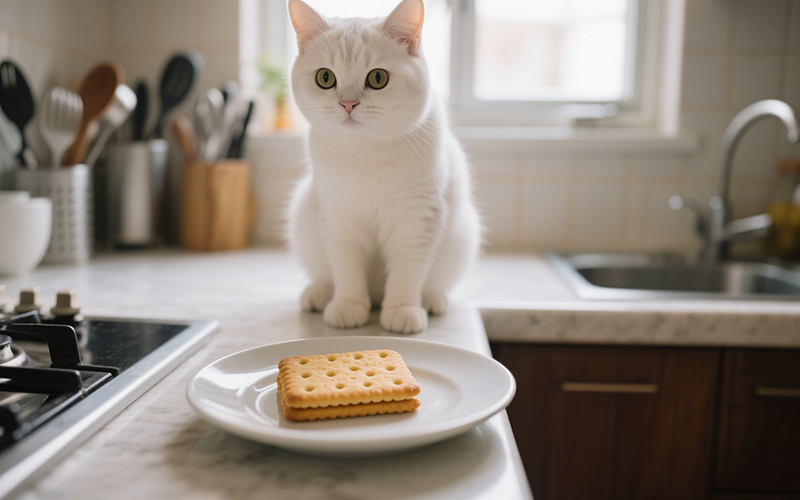
Can Cats Eat Ritz Crackers? Vet-Reviewed Risks & Why You Should Say No
- 30 Apr 2025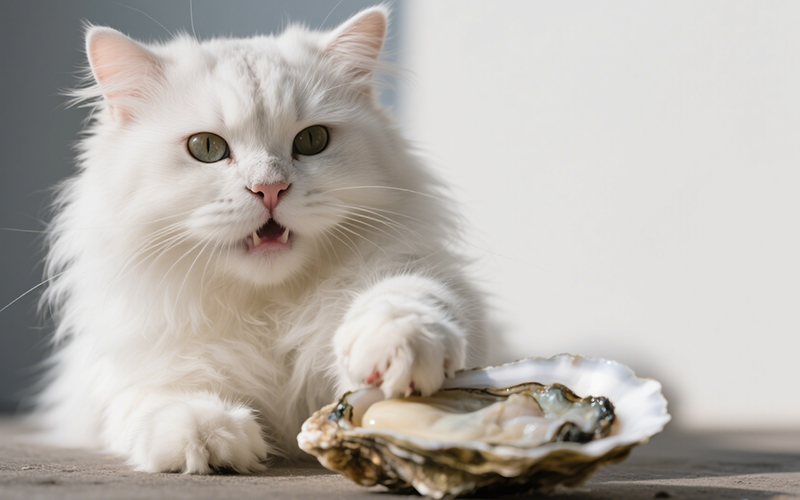
Shucking the Myths: Can Cats Eat Raw Oysters? A Deep Dive into Feline Safety
- 29 Apr 2025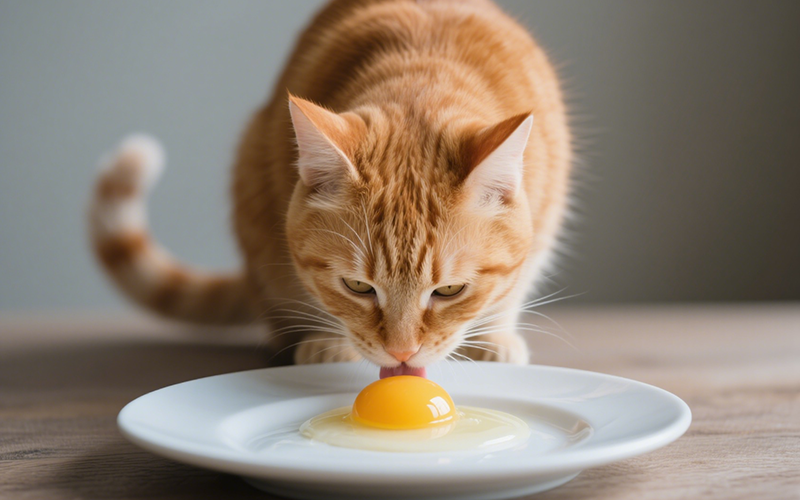
Raw Deal? Can Cats Eat Raw Egg Yolk Safely? A Vet-Reviewed Deep Dive
- 29 Apr 2025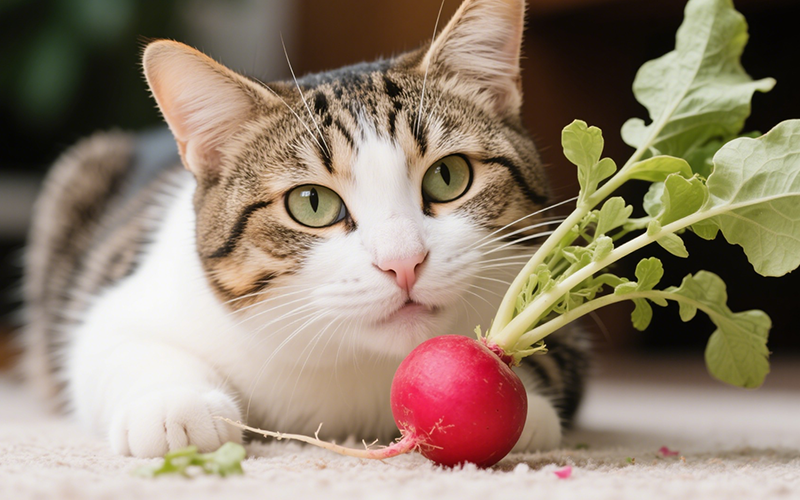
Radish Reality: Can Cats Safely Nibble This Peppery Root? A Vet-Reviewed Guide
- 28 Apr 2025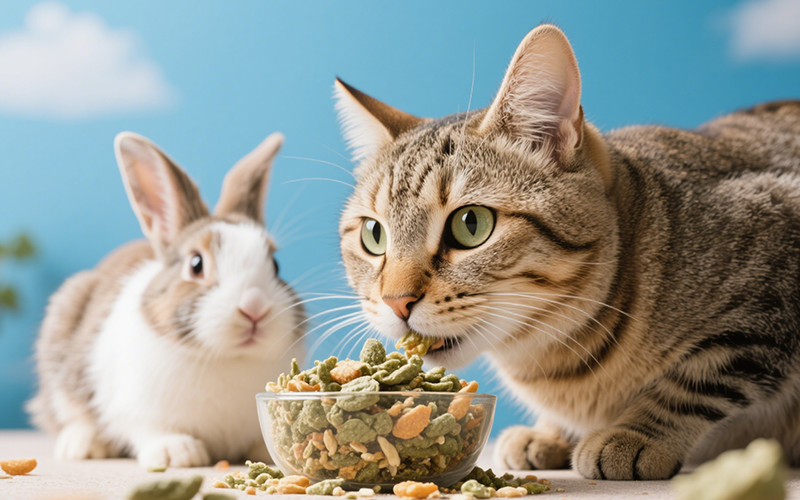
Rabbit Food & Felines: Can Cats Eat Rabbit Food Safely? Why Vets Say No
- 28 Apr 2025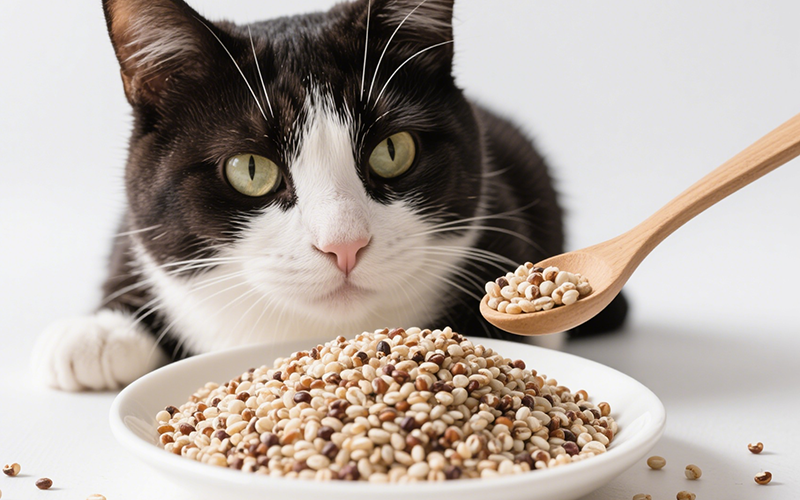
Quinoa for Kitties? Unraveling the Safety of This Trendy Grain for Cats
- 26 Apr 2025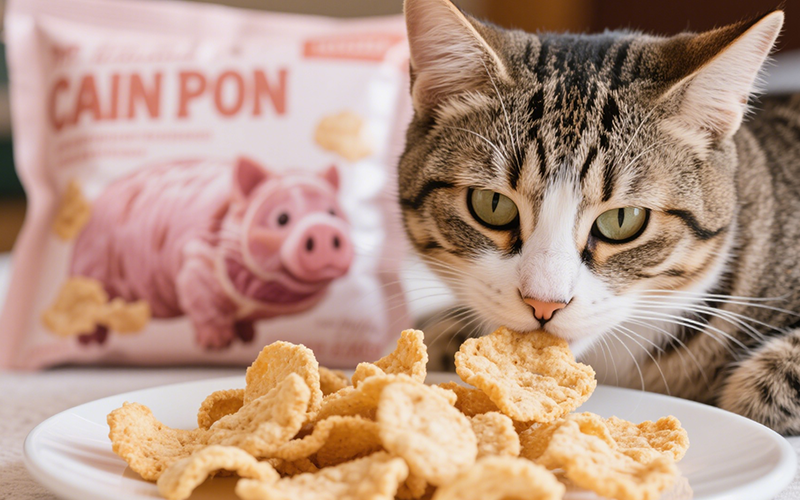
Crunch Time Danger: Can Cats Eat Pork Rinds? A Vet's Perspective on This Salty Snack
- 26 Apr 2025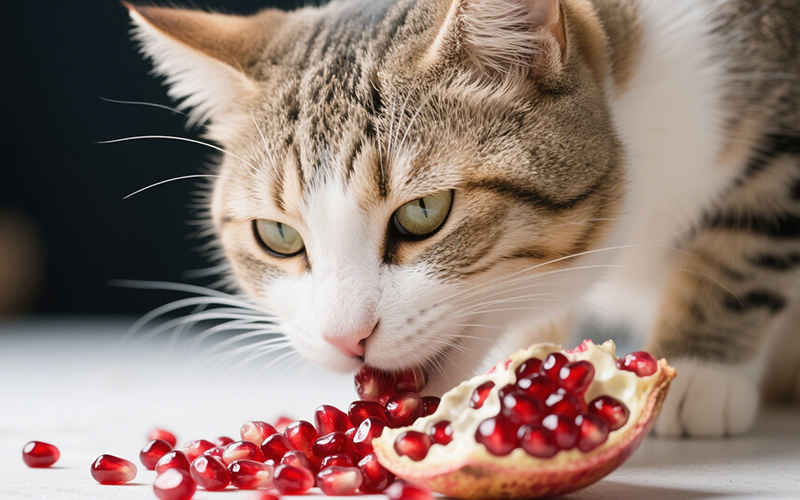
Pomegranate Peril: Can Cats Eat the Seeds Safely? A Vet-Reviewed Guide
- 25 Apr 2025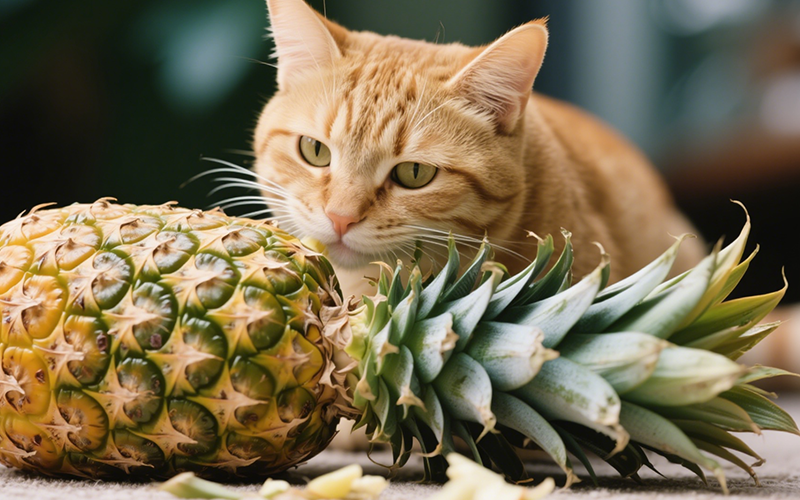
Prickly Problem: Can Cats Eat Pineapple Leaves Safely? A Vet-Reviewed Risk Analysis
- 25 Apr 2025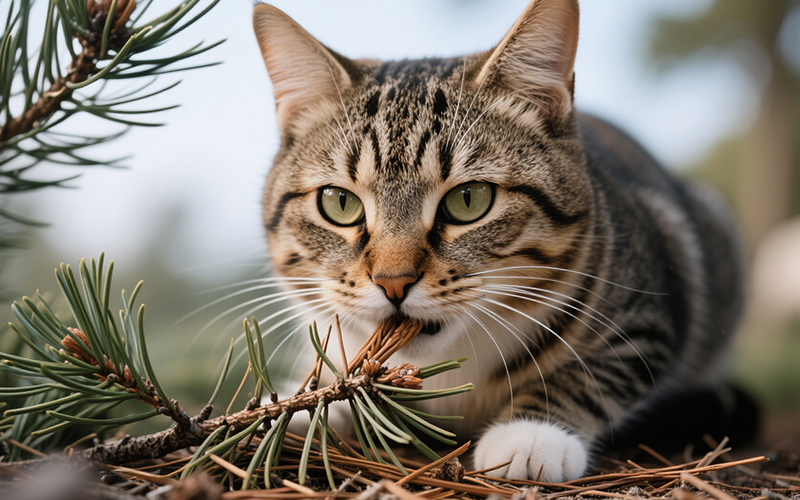
The Prickly Truth: Can Cats Eat Pine Needles Safely? A Guide for Concerned Owners
- 24 Apr 2025
